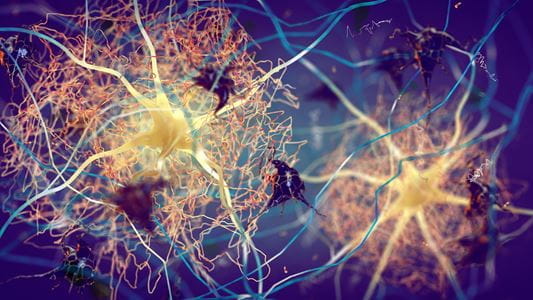INDIANAPOLIS – A new study by Indiana University School of Medicine researchers has found that increased expression of a gene linked to Alzheimer's disease helped improve characteristics of the disease in mouse models. Gene expression is a series of molecular events that turns on particular parts of the DNA to inform how cells function.
While previous genetic studies in humans identified the SPI1 gene as a risk factor for Alzheimer's disease, the IU School of Medicine-led team's research sheds new light on how different levels of SPI1 affect the development and progression of Alzheimer's disease. Their findings were recently published in Nature Communications.
 "Scientists recently found a gene called SPI1 that is genetically linked to Alzheimer's disease, however, they were not sure if having more or less of this gene would be helpful," said Jungsu Kim, PhD, the P. Michael Conneally Professor of Medical and Molecular Genetics at the IU School of Medicine and senior author of the study. "So, we studied altered levels of SPI1 to see how it affected Alzheimer's pathology. We found that reducing SPI1 made Alzheimer's disease symptoms worse, while increasing SPI1 actually helped improve the condition."
"Scientists recently found a gene called SPI1 that is genetically linked to Alzheimer's disease, however, they were not sure if having more or less of this gene would be helpful," said Jungsu Kim, PhD, the P. Michael Conneally Professor of Medical and Molecular Genetics at the IU School of Medicine and senior author of the study. "So, we studied altered levels of SPI1 to see how it affected Alzheimer's pathology. We found that reducing SPI1 made Alzheimer's disease symptoms worse, while increasing SPI1 actually helped improve the condition."
Byungwook Kim, PhD, first author of the study and an assistant research professor of medical and molecular genetics at the IU School of Medicine, said the opposing effects of SPI1 modulation are particularly fascinating because they suggest a very specific role for SPI1, where a precise level is crucial for proper function.
"Understanding this precise role could lead to the development of targeted therapies for Alzheimer's disease that modulate SPI1 activity in a controlled manner, avoiding the potential downsides of simply increasing or decreasing its overall expression," Byungwook said.

Jungsu, who is also an investigator in the Stark Neurosciences Research Institute, said this study was made possible by the collaborative research environment fostered by leadership and colleagues at the IU School of Medicine.
"This has allowed for a seamless exchange of ideas, mutual learning and efficient teamwork on this project," he said. "Without this kind of support, the project's completion timeline could have easily stretched by a few additional years."
The research team is working with IU School of Medicine's Timothy Richardson, PhD, a senior research professor of medicine and investigator on the Target Enablement to Accelerate Therapy Development for Alzheimer's Disease (TREAT-AD) program, on a potential drug discovery effort related to these findings.
About the IU School of Medicine
The IU School of Medicine is the largest medical school in the U.S. and is annually ranked among the top medical schools in the nation by U.S. News & World Report. The school offers high-quality medical education, access to leading medical research and rich campus life in nine Indiana cities, including rural and urban locations consistently recognized for livability. According to the Blue Ridge Institute for Medical Research, the IU School of Medicine ranks No. 13 in 2023 National Institutes of Health funding among all public medical schools in the country.
Writer: Andrea Zeek, anzeek@iu.edu
Sources: Jungsu Kim, jk123@iu.edu, and Byungwook Kim, bk18@iu.edu
For more news, visit the IU School of Medicine Newsroom: medicine.iu.edu/news
Follow us on X: @IUMedSchool




